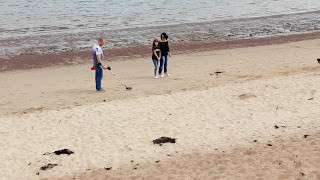Yesterday was a sad day as my ex Brother-in-Law was laid to rest in Kemnal Park cemetery in South East London.
It was also a very interesting day as I learnt a little about Muslim hospitality and generosity. Dave (known to his Muslim brothers as Daoud) had converted to Islam a few years ago so his burial was in accordance with Muslin practice and traditions. The service took place in the Greenwich Islamic centre in Plumstead.

Normally men and women pray in separate areas but the Imam was generous enough to allow non-Muslim male and female friends and family to sit at the back of the prayer room and watch the ceremony. One of the Imams made sure that we were comfortable, offered us water, and explained what was going to happen during the ceremony. A coffin, or casket, was wheeled into the room and set to one side while the usual 1 p.m. prayers were being said. After prayers the coffin was moved to the centre and special prayers (salah) and a eulogy were said for David. He had been an active member of the Muslim community and always had a ready smile for his Muslim brothers. He was well liked and respected by them all. At the end of the prayers many of the worshippers came over to offer their condolences. By this I mean the Muslim men shook hands with the men in our group. They would not, of course, shake hands with the women because their religion doesn't allow it. Our party was then led into a side room where the female congregation offered their condolences to the ladies in our group.
From the Mosque we went to the cemetery for the burial. Once more the Imam was kind enough to bend their rules so that females could be at the graveside. We non-Muslims were all amazed how many Muslims were there to pay their last respects. As I have already said Daoud was a popular member of the community. Again everything was explained to us before it happened and once the body had been placed in the grave and arranged to face the Qibla a wooden covering was laid on top of the body. The family were invited to be the first to throw handfuls of soil into the grave. His Muslim brothers then took turns to throw soil, at the same time reciting a Quranic verse in Arabic meaning "we created you from it and return you into it, and from it We will raise you a second time".
I was struck throughout by the compassion and the friendliness shown to us 'non-believers'.
Meeting and greeting so many Muslims face-to-face and on such a personal level helped to dispel, in my mind at least, the popular fallacy that all IS are Muslims, therefore all Muslims must be terrorists. We are all people in the eyes of the Lord, whichever God you believe in.
Rest in Peace Dave.



















































